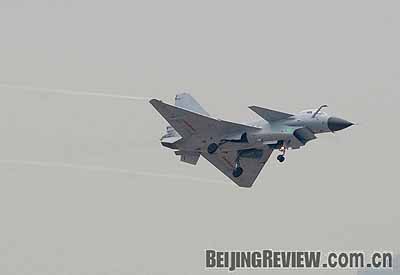| China issued a white paper on national defense in late January, pledging to remain committed to peaceful military development.
 |
|
NEW WEAPONRY: The Jian-10, China's homemade fighter aircraft, performs during the Seventh China International Aviation and Aerospace Exhibition in Zhuhai, in southern Guangdong Province (LU HANXIN) | The paper, the sixth of its kind issued by the Chinese Government since 1998, gave an overall picture of China's national defense ranging from the security environment and national defense policy to defense expenditure and arms control.
The paper, issued by the Information Office of the State Council, for the first time unveiled China's ambition of "basically accomplishing mechanization (of the military) and making major progress in informationization by 2020" and "realizing modernization by the mid-21st century."
Vowing to strengthen the military by means of science and technology, the paper said China was working to "develop new and hi-tech weaponry and equipment, conduct military training in conditions of informationization and build a modern logistics system in an all-round way."
On China's military strategic guideline for active defense, the paper said it "aims at winning local wars in conditions of informationization" and "lays stress on deterring crises and wars."
On the current effort to streamline the armed forces, the paper said China is aiming at developing a complete set of "scientific modes" of organization, institutions and ways of operation by 2020.
"China pursues a national defense policy which is purely defensive in nature," the paper said. A report in Jiefang Daily on January 21 quoted Chen Zhou, a researcher with the Academy of Military Sciences of the Chinese People's Liberation Army (PLA), who said, "China's defensive national defense policy is consistent with China's development strategies and foreign policies as well as people's fundamental interests and world development trends."
The Second Artillery Force
The paper for the first time specified in detail China's long-standing policy of "no first use of nuclear weapons."
"In peacetime, the nuclear missile weapons of the Second Artillery Force are not aimed at any country," the paper said while reaffirming the country's will to implement "a self-defensive nuclear strategy."
"But if China comes under a nuclear threat, the nuclear missile force of the Second Artillery Force will go into a state of alert, and get ready for a nuclear counterattack to deter the enemy from using nuclear weapons against China," the paper said.
The paper also said, "If China comes under a nuclear attack, the nuclear missile force of the Second Artillery Force will use nuclear missiles to launch a resolute counterattack against the enemy either independently or together with the nuclear forces of other services."
Under the direct command of the Central Military Commission, the nuclear-armed force is aimed at deterring nuclear strikes from other countries and conducting nuclear counterattacks and precision strikes with conventional missiles.
Security situation
Describing China's general security situation as "improving steadily," the 105-page document said, "the situation across the Taiwan Straits has taken a significantly positive turn."
The paper attributed the improvement to the failed attempts of the separatist forces for "Taiwan independence," the progress made in cross-straits consultations and China's capability for upholding national security.
Answering questions at the press conference on the release of the white paper, Defense Ministry Spokesman Hu Changming, said China has limited deployment of military forces on the Taiwan Straits based on the nation's fundamental security interests.
"When the (mainland's) military deployment is going to be readjusted will be decided in accordance with changes in the developing situation across the Taiwan Straits," he said.
He called for the two sides to step up contacts and exchanges on military issues "at an appropriate time" and talk about a military mechanism of mutual trust, in a bid to ease military concerns and stabilize cross-straits relations.
"China is still confronted with long-term, complicated, and diverse security threats and challenges," the paper said, listing the threats of separatist forces of "Taiwan independence," "East Turkistan independence" and "Tibet independence."
"In particular, the United States continues to sell arms to Taiwan in violation of the principles established in the three Sino-
U.S. joint communiqués, causing serious harm to Sino-U.S. relations as well as peace and stability across the Taiwan Straits," the paper said.
China-U.S. military ties were strained after the Pentagon announced a $6.5 billion arms deal with Taiwan in October 2008. The deal included 30 Apache attack helicopters and 330 Patriot missiles.
| 